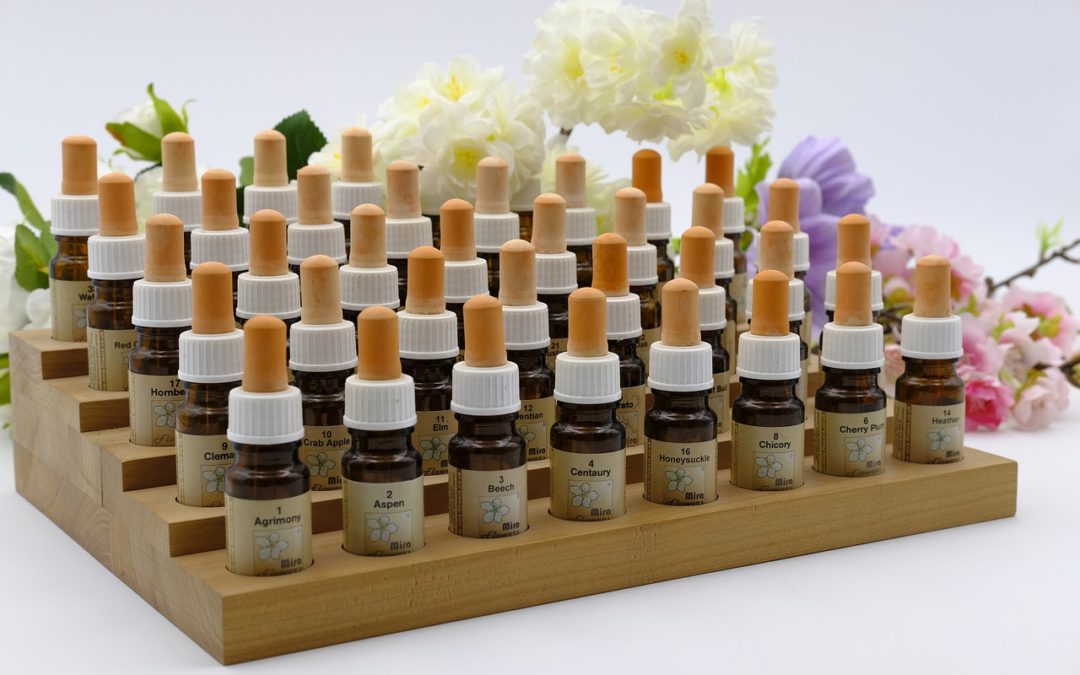What are flower essences?
Flowers are conscious, intelligent forces. Flower essences – a unique form of herbalism – are a concentrated encapsulation of this life force which we can use in our everyday lives for happiness, emotional wellbeing and healing. Flower essences are tinctures made primarily from flowers, trees and plants, but there are ranges of environmental, crystal and even animal essences. They are safe to use and are considered suitable for everyone from young children to the elderly.
Herbalism, and the use of plants and flowers for healing, has been around for as long as recorded history, but modern-day flower essences were founded by Dr Edward Bach, creator of the Bach Flower Remedies. In 1930, Dr Bach, a medical doctor, decided to search for a new healing technique and spent the spring and summer discovering and preparing new flower remedies which held the pattern of energy of the flower.
Bach’s flower remedies were intuitively derived and based on his connection to the plants. If he felt a negative emotion, he would hold his hand over different plants, and if one alleviated the emotion, he would ascribe the power to heal that emotional problem to that plant. He believed that early morning sunlight passing through dew-drops on flower petals transferred the healing power of the flower onto the water, so he would collect the dew drops from the plants and preserve the dew with an equal amount of brandy to produce a mother tincture which would be further diluted before use. Later, he found that the amount of dew he could collect was not sufficient, so he would suspend flowers in spring water and allow the sun’s rays to pass through them.
How are they made today and how do they differ from essential oils?
Essences contain the energy signature of the plant or flower and they are still made in a similar way to the method of Dr Bach described above. Typically, flowers or parts of a plant are freshly picked and placed into a crystal bowl of spring water. The bowl is then placed near to the plants being used and ideally in full sunlight (or moonlight). Over time, the energy signature of the plant is transferred to the water and the water starts to show tiny bubbles once this exchange has taken place. Essences from tougher or more woody plants can also be made by boiling parts of the plant in water. Because crystal glass and water are conductors of energy, essences can also be made by placing the crystal bowl next to, or amongst, the plant without any blooms or leaves being added directly to the water. Once the essence is ready, the water is collected, any blooms or leaves are discarded, and the water is mixed with a pure spirit (typically vodka or brandy) for preservation. Flower essences are officially classified as food supplements.
Flower essence producers are nearly always ‘called’ to make an essence. A flower may strike them as the antithesis of an emotion or situation they would like to heal, or a plant or flower may literally catch their eye or give them a strong feeling or sensation. Whilst making an essence, the producer will sit and tune into the plant and through meditation or intuition, will pick up on the signature or characteristics being offered by the plant.
The Doctrine of Signatures is also an integral part of flower essence therapy. This is the concept that plants are given to us through nature’s conscious design to heal body parts which the plant or herbs resemble physically. An example of this is something like walnuts being good for the brain (consider the similarity in both of their forms). The plant’s shape, colour, smell, taste and growth patterns can all give clues to its healing use both physically and emotionally.
Essential oils are very different to essences. Pure essential oils are extracted from plants through steam distillation. Freshly picked plants are suspended over boiling water, and the steam pulls the oil out of the plant and since water and oil does not mix, the two separate and the essential oil is collected.

How are essences used? What are they particularly useful for?
Flower essences are tools for transformation, catalysts for change. They offer emotional balance and harmony by enhancing the positive aspects of the qualities of mind, emotion and personality. By providing a person with positive qualities, the negative aspects or lack of positive are dissolved, and balance is restored. We all have different qualities of emotion and personality traits, and taking flower essences brings us back into harmony with the positive aspects of a quality, shifting us from negative to positive. Essences help us to release negative emotional and behavioural patterns that may be blocking our emotional and spiritual growth.
The tincture – the water containing the essence, combined with alcohol as a preservative – can be taken as drops under the tongue or added to a bottle or glass of water to sip throughout the day. Because they work energetically, flower essences make beautiful aura sprays and the mists can also be used to clear rooms and physical spaces. Mists are made by combining an essence(s) with spring water and essential oils.
Essences can be taken singly or combined. Practitioners can select essences through their in-depth knowledge of particular ranges, or can select essences intuitively (through instinct or dowsing). Essence producers usually provide a photograph of the plant/flower and a full description of its qualities and attributes. Many ranges also sell a deck of insight cards as an additional tool to choose remedies. Even complete newcomers to essences are often wonderfully surprised at how well they are able to intuitively select the perfect essence for their situation just by looking at the photographs and seeing which one jumps out!
Can they be incorporated into massages and facials?
Essences can be added into creams and lotions very easily. This is also the best way to offer them to patients who may wish to avoid ingesting alcohol. Simply add a few drops into a base lotion and apply during a treatment. Alternatively, add the drops to face or body cream for daily use.
How can I find out more or undertake training?
The British Flower & Vibrational Essences Association (BFVEA) contains a wealth of research and information about the various UK essence ranges and also a member directory, where you can find details of registered practitioners. Their website also lists accredited training courses where you can learn about various ranges and producers and how to make essences of your own. The Bach Centre in Oxfordshire offers training on the Bach Remedies.
What makes them special?
Flower essences are wonderful tools for emotional well-being. Their energy is light and refined and their effects can be gentle, yet effective. The biggest benefit of using flower essences is that they reconnect you to plants and nature, something that is essential for all of us at this time in our planet’s history.
 This was an article that I wrote for Holistic Therapist Magazine in the October 2018 edition, a UK magazine for Holistic Therapists and designed specifically for the desires and requirements of practising and studying holistic and Complementary professionals.
This was an article that I wrote for Holistic Therapist Magazine in the October 2018 edition, a UK magazine for Holistic Therapists and designed specifically for the desires and requirements of practising and studying holistic and Complementary professionals.



Recent Comments